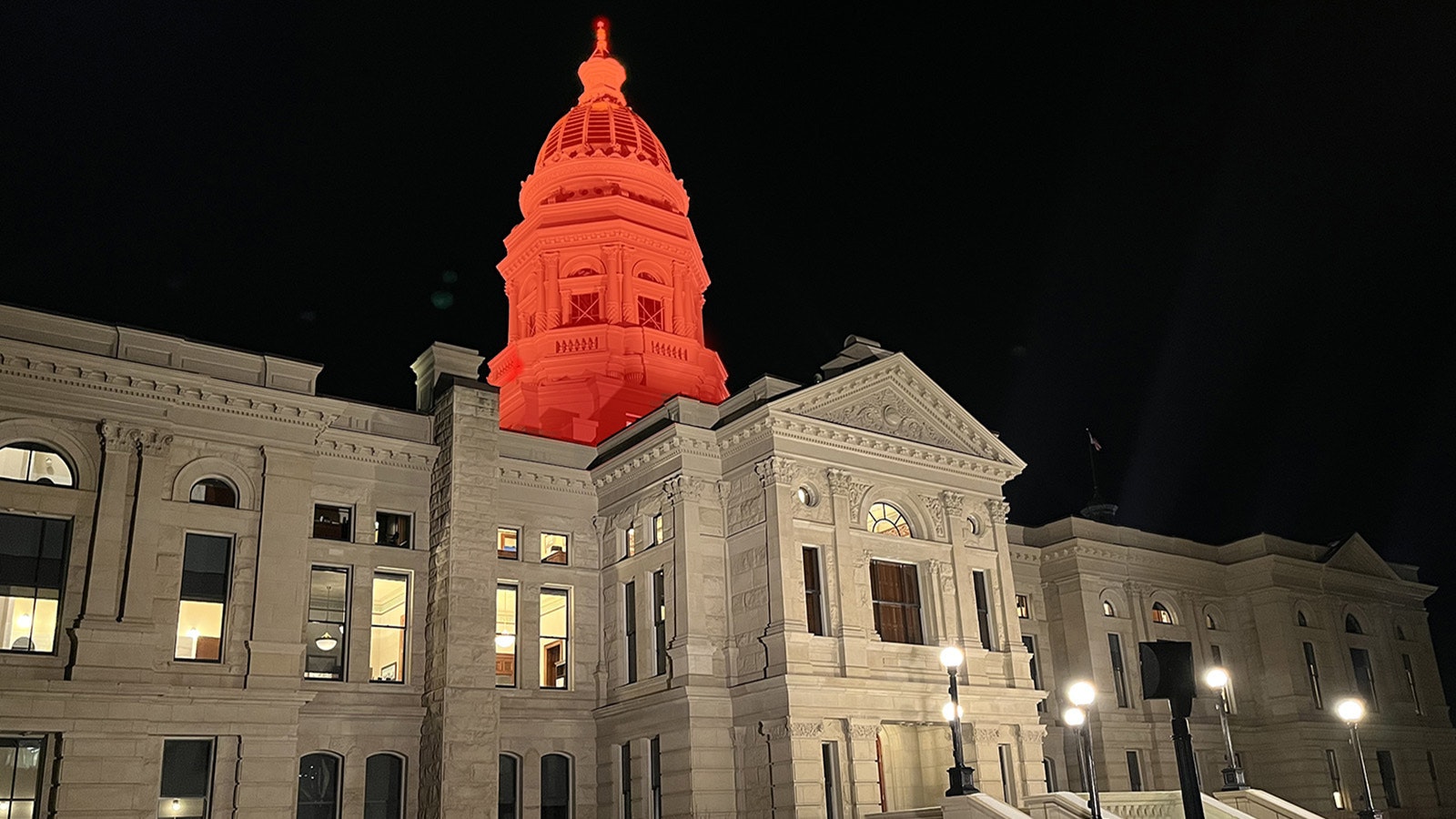As the Wyoming Legislature has taken a more far-right bent after the general election, so has the legislation that’s being considered during this 2023 session.
That the Cowboy State is one of the most conservative red states in the nation has long been a hallmark of the Legislature. Just how conservative the 93 members of the state House and Senate should lean is being tested.
State Sen. Charles Scott, R-Casper, said the question of whether to approve some of the far-right legislation proposed this session has been a political tug-of-war at the state Capitol in Cheyenne. He said that reaches a crescendo on bills that involve the state’s relationship with the federal government, managing its boom-bust mineral cycles and what to do with a revenue surplus of about $1.7 billion.
“Unquestionably, it has become more conservative (legislative sessions) because the population at large has become conservative because of the same issues that have come to the forefront,” said Scott, the elder statesman of the Legislature.
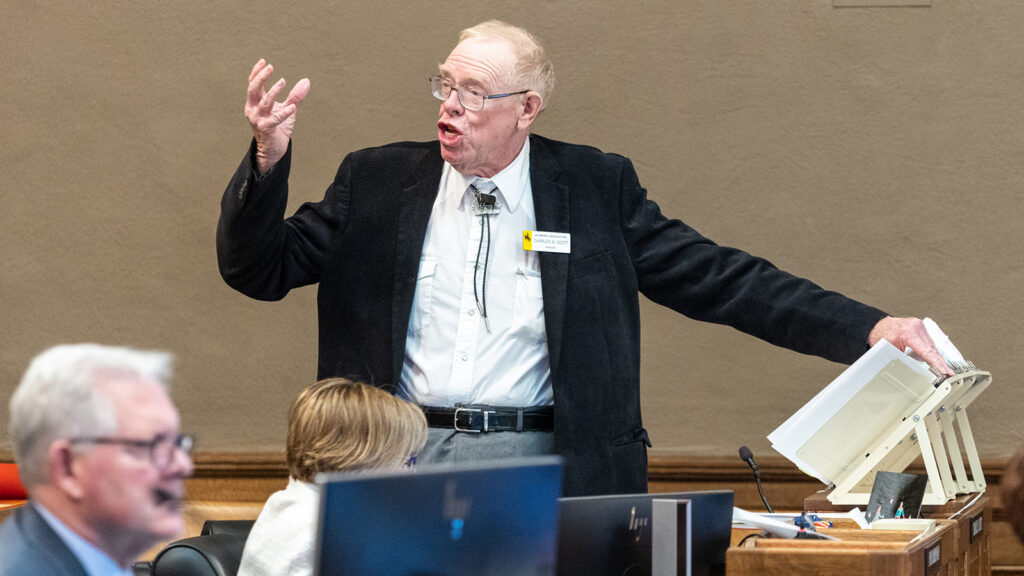
Right Makes Might
Scott entered the Legislature in 1979, just a few years in the wake of a highly contentious debate on abortion in Wyoming and nationwide.
“When I first came, there was just great bitterness within the Legislature because there had been a knock-down, drag-out fight,” he said.
That’s come full circle as lawmakers deal with the aftermath of last June’s U.S. Supreme Court reversal of the 1973 Roe v. Wade decision. A bill debated on the House floor Wednesday that would make every form of abortion illegal in Wyoming wasn’t met with much resistance on the merits of abortion itself.
The loudest opposition came from those who question the bill’s constitutionality, not its intent.
Although often drafted, particularly conservative bills have sometimes struggled in years past, usually demoted to the bottom of the majority floor leader’s stack of bills or openly opposed by a majority of legislators on the floor or in committee.
A handful of hardline conservative bills have not only received significant consideration this year, but also a certain level of success so far during the 2023 session.
“That’s to be expected with more representation from hardline lawmakers, said Rep. John Bear, R-Gillette. Bear leads a growing group of further-right conservatives called the Wyoming Freedom Caucus.
“This body is moving much further to the conservative direction,” Bear said. “The legislation is going to be a natural outgrowth of that.”
COVID Bills Show A Shift
An example is Casper Republican Rep. Jeanette Ward’s House Bill 66, which would have prohibited discrimination of people who choose to not follow face mask, vaccine or COVID-19 testing mandates in Wyoming.
While HB 66 ultimately failed, it passed a House committee vote and two votes on the House floor before finally being defeated 32-29-1 on its third reading on the floor.
That such a far-right conservative piece of legislation would move that far and with such a close vote margin shows a shift in the Legislature. It’s the most movement on public health legislation since the pandemic began in 2020, said House Majority Floor Leader Chip Neiman, R-Hulett.
Even with a special session called specifically for COVID response, “we couldn’t get done what that representative did in 60 seconds in her first run,” said Neiman, who also aligns with the Freedom Caucus. “I think that tells us there’s a pretty dynamic shift. I think a lot of people have seen enough.”
Bear said Ward’s bill may have advanced even further if she had taken his advice to make some changes to the bill that were later made anyway in the form of amendments.
“She realized that if you want to get a bill this far, it’s something you have to do,” he said.
A similar bill exempting Wyoming from following public health guidelines set by the Centers for Disease Control and Prevention and World Health Organization advanced even further, only defeated by two votes on its third reading.
“Ultimately, I think it was indicative of the fact that it’s a far more conservative chamber, and I think that they are exerting that,” Neiman said. “I think we’re starting to see it in so many of these pieces of legislation.”
‘Racist Legislation?’
A few other pieces of more conservative legislation that experienced success included three bills restricting foreign ownership of land in Wyoming. Two of the bills easily advanced out of committee, but all ultimately failed.
The conservative bills also have attracted some criticism.
“With the rise of the extremists in full effect here in Wyoming, racist legislation like this is going to become more common,” said Antonio Serrano, advocacy director for the American Civil Liberties Union of Wyoming, about the foreign ownership bills. “This kind of racism has always existed – just ask Wyoming’s BIPOC (Black, indigenous and people of color) communities.
“We have lived with this hate for a long time, but the difference now is those hateful, racist people are running for office and other positions of power.”
The farthest-reaching of the three foreign ownership bills was brought by Rep. Bill Allemand, R-Casper, whose legislation titled “Prohibiting Foreign Property Ownership in Wyoming” not only would have prevented people from certain countries owning agricultural land, but also would have prevented them from owning any business property in Wyoming.
Scott said there has been a noticeable trend of more conservative bills being made in recent years seeking to address social issues. He said this is partly a result of trying to address new “issues.”
Scott has been part of this trend, bringing a bill this session that would prohibit minors from receiving gender reassignment surgeries in Wyoming.
“The Legislature is a representative body, and you get the feelings of the population at large represented down here,” he said.
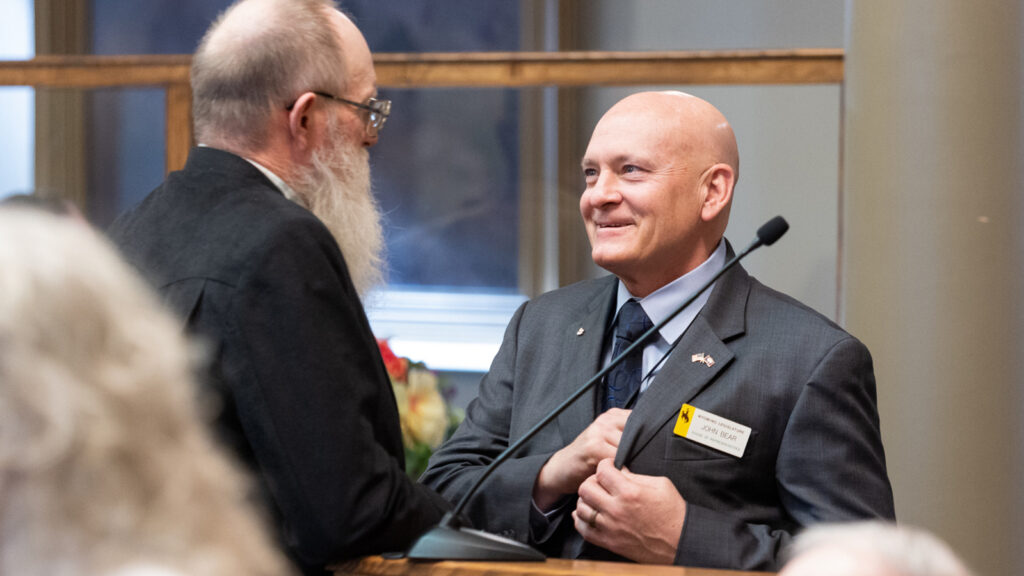
Freedom Caucus Influence
The rightward drift of the Legislature has run parallel with the rise of the hardline conservative Wyoming Freedom Caucus.
Shortly before the start of the 2023 session, the Freedom Caucus announced it would work under the umbrella of the nationally based State Freedom Caucus Network.
Rep. Karlee Provenza, D-Laramie, said she has seen a distinct trend of national talking points surfacing in the Legislature. She first noticed the rhetoric used by many lawmakers during their 2022 campaigns, which has since carried over into many of the bills brought to this year’s Legislature.
“It’s hard for me to support bills that don’t affect anything that’s been happening here in Wyoming,” she said.
From election security to transgender surgeries to environmental social credit scores and rodeo bans, many bills have had an underlying common theme of getting ahead of a problem, an explanation usually given when it’s pointed out that said problems haven’t been documented in the state.
Bear stresses that the Wyoming Freedom Caucus is largely autonomous from the national organization, but he also acknowledged that the local group has more resources at its disposal because of the affiliation with the national group.
The Wyoming Freedom Caucus also has the assistance of a full-time staffer in Jesse Rubino, who is the Wyoming state director for the organization and paid by the national group.
She also has a connection to the Secretary of State’s office run by Chuck Gray, as her husband Joe Rubino is the chief policy officer for the office. Gray is a former Freedom Caucus member.

Representation Reflects The Voters
Another possible source of the turn to national topics is a focus of constituents who elect these legislators.
The COVID-19 pandemic ushered in a wave of transplants to Wyoming, most of whom were drawn to the state for its conservative views and low taxes. Most of the politically involved members of this group have expressed very conservative views statewide.
Ward is one of them, moving to Wyoming from Illinois in 2021.
“We’re definitely more conservative because we have 26 people who are more conservative than what we’ve had before,” said Rep. David Northrup, R-Powell, a longtime legislator not associated with the Freedom Caucus.
On most votes taken during the 2023 session so far, there’s a bloc of roughly 26 members who align with the Freedom Caucus and usually vote the same way. As far as there being an organized effort to vote together as a group, Bear said he makes recommendations but no orders.
“It’s more about informing people of what the unintended consequences of the bill are,” Bear said. “At the end of the day, we’re trying to inform members of those things. That’s what’s made us more cohesive.
“I’m tickled with how well we’re voting together, but it’s just not something we demand.”
The power of this voting bloc flexed Thursday, bringing frustration in its wake.
House Joint Resolution 2, a proposed constitutional amendment to create a separate classification for residential property, failed to pass the House on a 37-25 vote, as a two-thirds supermajority is required for constitutional amendments.
“Surprisingly, House members associated with the so-called Freedom Caucus voted as a bloc against (the bill),” Rep. Clark Stith, R-Rock Springs, said in a Thursday press release.
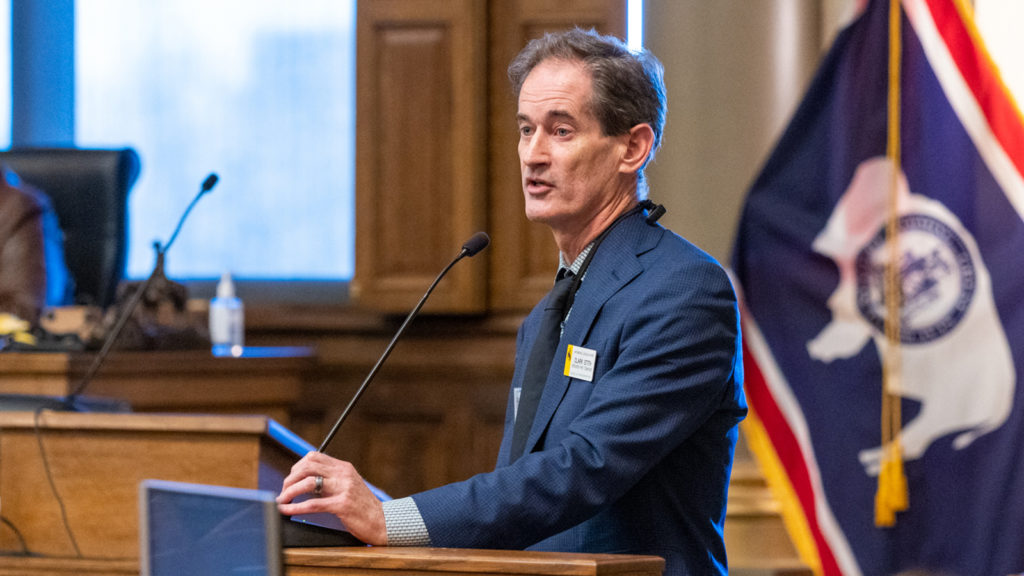
Party Polarity
There’s also a visible divide within the voting patterns of Republican legislators.
According to Evidence Based Wyoming, which examines legislative data, there are 19 Republicans in the House who have been more closely aligned to Democrats than the average Republican in their voting so far in the 2023 session. In the Senate there are eight Republicans voting closer to Democrats than the average of their own party.
“It’s a three-party state,” Neiman said. “Left, middle and the right.”
Senate President Ogden Driskill, R-Devils Tower, said some lawmakers may not understand the consequences of the legislation they’re bringing.
“This is actual hard actions that are hard to undo, and it hurts people’s lives,” he said. “And I don’t think we’ve been deliberating enough on our side. We’ve really run a good machine and we’re going, but we’re having a hard time really understanding the consequences of some of it.
“They make you feel good but do they really help the people in Wyoming?”
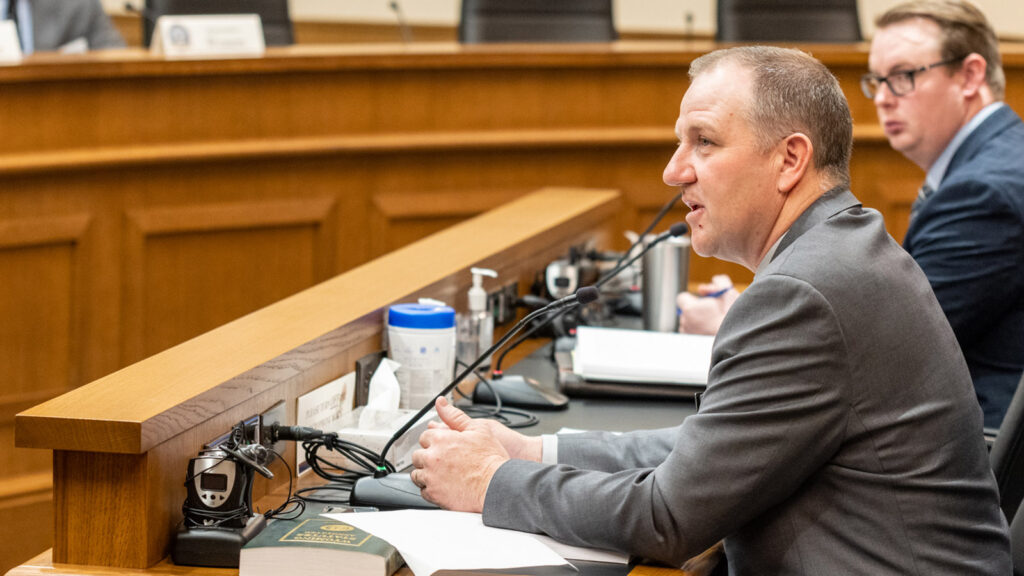
Power Of The Majority Floor Leader
Of the 256 bills still remaining in the session, only two were brought by Democrats as lead sponsors.
House Speaker Rep. Albert Sommers, R-Pinedale, a more moderate Republican, said he has kept a number of bills in his drawer this year because he thought they were bad policy or poorly timed.
It’s the responsibility of the speaker to choose to send bills to committee. Once a bill advances out of committee, it’s the discretion of the majority floor leader whether it’s heard for debate.
Sen. Eric Barlow, R-Gillette, said when he was majority floor leader, he tried to be as fair as possible with what bills were heard, but still faced significant criticism at times for his choices.
That’s now Neiman’s responsibility.
“I’m trying to be very balanced,” Neiman said about the bills he allows to be discussed on the House floor. “I’ve tried to be very comprehensive and very fair.”
As majority floor leader, Neiman makes the schedule for bills heard each day. Unless a two-thirds vote is made to override his scheduling, Neiman holds the power to decide if some bills die and others survive due to the time limits of when bills must be addressed.
Neiman said part of the challenge this year has been the slow speed the Legislature has been working in getting bills passed through committees.
“I don’t know that it’s gridlock or anything like that,” he said. “I think it’s just indicative of just a lot of new legislators. A lot of it is having to try to learn and go through a piece of legislation.”
Out Of The Drawer
Neiman has been criticized for not bringing House Bill 92 up for debate, which would have created incentives for filmmakers who shoot their Wyoming storylines in the Cowboy State.
Sean Higgins, founder of Wyoming-based Story House Pictures, told Cowboy State Daily he believes the bill was targeted by the Wyoming Freedom Caucus and Neiman.
“That was strategy to not have the bill introduced. It had the votes in the House to pass … and be supported to its next stage,” he said.
Another critical bill that Neiman didn’t pull out of his drawer was for Medicaid expansion, but he did allow a bill granting a Medicaid extension for postpartum mothers, which passed the House on a 34-28 vote.
“Medicaid expansion, I have a lot of heartburn that nobody’s been able to tell me what is the federal government going to do once we open that and let that out?” Neiman said. “I don’t even know that it passes this body. Personally, I don’t believe it would.”
But Neiman did go to bat for Ward’s bills and a bill seeking to address crossover voting, the process of people switching party affiliation to vote in another party’s primary election. Election reform measures like eliminating crossover voting have been high priorities for far-right conservatives since the 2020 presidential election.
“I tried to make a point to get that up because I know so many people had this in last year,” Neiman said.
Some Resistance
Although many of the ultra-conservative bills have made it remarkably far in this year’s Legislature, the majority have already met the chopping block.
The last crossover voting bill died Thursday morning.
The Life is a Human Right Act, which would have prohibited all forms of abortion in Wyoming, including in cases of rape or incest, was given a significant caveat Wednesday requiring the state’s attorney general to wait to review the law until after the 2022 trigger ban is deemed unconstitutional.
Another bill brought by Sen. Larry Hicks, R-Baggs, would have devoted more than $5 million to support Southern states in building a border wall and transporting migrants. This bill was defeated in the Senate on an 18-12 vote.
Over the last 10 years, the Legislature has made a migration to the right in terms of membership.
Despite the GOP now likely holding the largest majority in state history, many conservative Republicans still express displeasure with others in their own party they don’t consider to be conservative enough.
With this discontent sure to fuel conservative motivation, the only question left is how far right will the Wyoming Legislature and other key elected positions migrate?
Much farther, if you ask Bear and the Wyoming Freedom Caucus.
“I’m never satisfied,” he said with a laugh.

